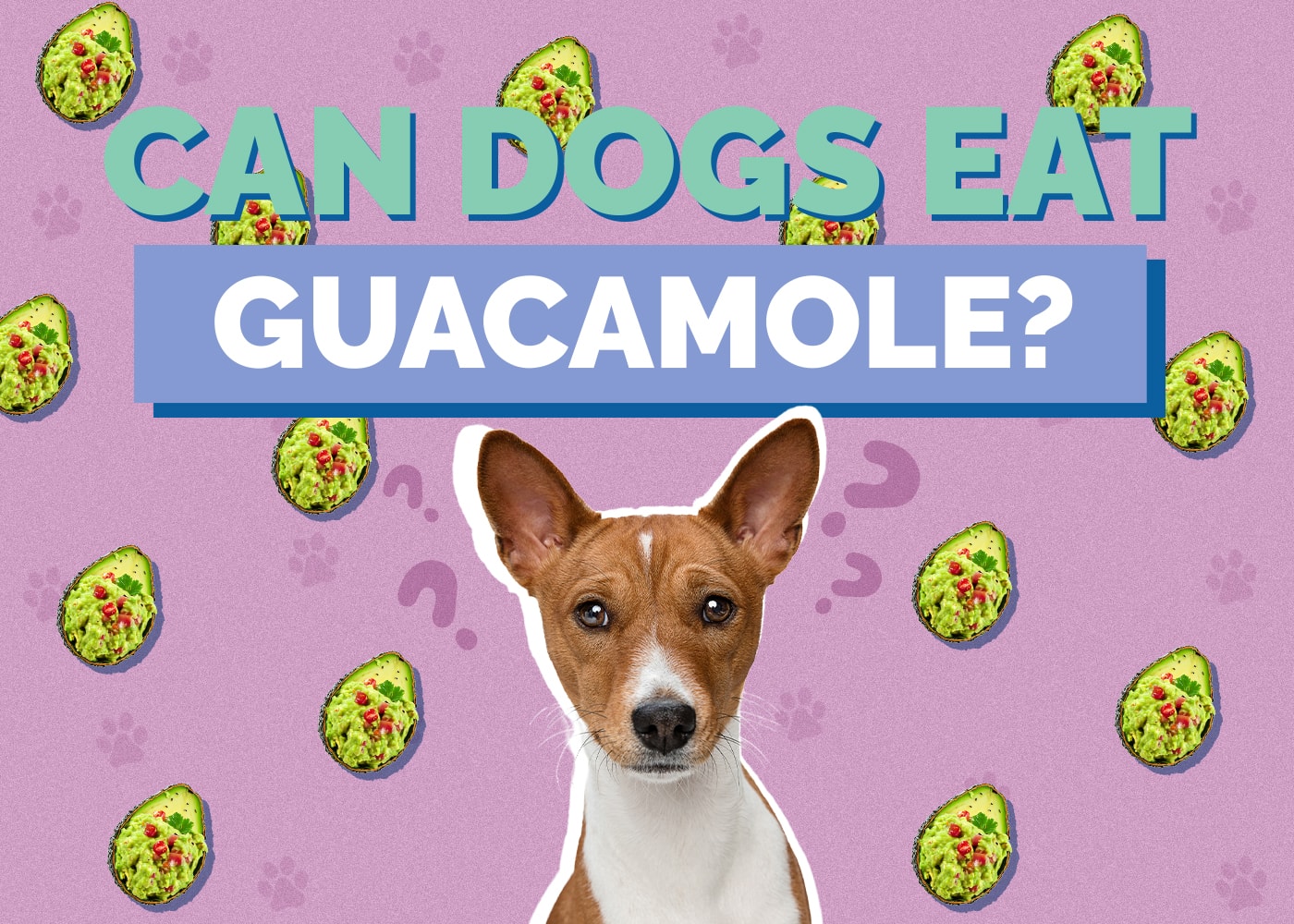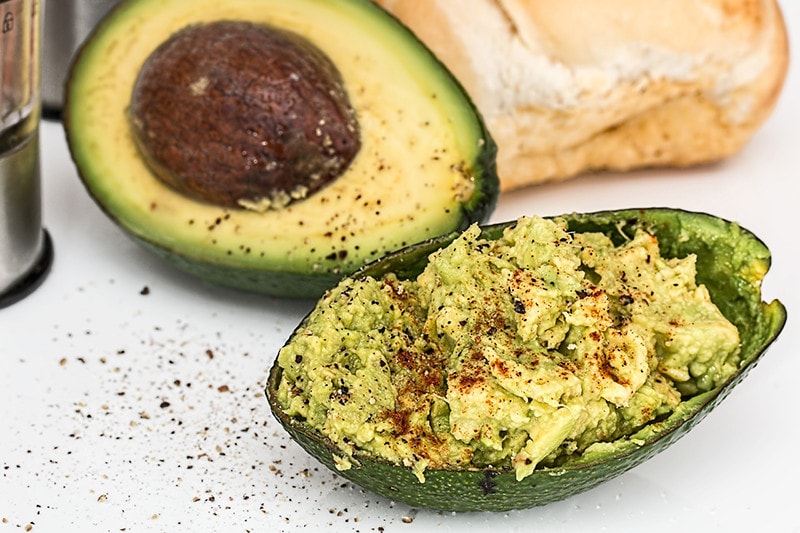Can Dogs Eat Guacamole? Vet-Reviewed Health Risks & FAQ

Updated on

Do you look forward to Taco Tuesday every week? We sure do! But what if your dog is staring at that leftover bowl of guacamole? Can you treat your dog to some guacamole on top of their kibble as a special treat?
Guacamole is certainly a healthy and tasty dip for humans, but the same isn’t true for our canine friends. Unfortunately, guacamole is not something you should be sharing with your dog, especially if there is onion or garlic in the mix.
We will break down the different reasons why that delicious (and even healthy for us humans) guacamole is not something you should be feeding your furry pals.
Facts About Guacamole
Guacamole can be traced back to the Aztecs before the 16th century and was eaten throughout what is now Mexico and South America. The name guacamole is derived from the Aztec word “ahuaca-mulli,” which translates as “avocado mixture.”
The main ingredient of guacamole is, of course, the avocado! These fruits are a rich source of antioxidants, vitamins, minerals, and healthy fats.
National Guacamole Day is September 16, the same day as Mexican Independence Day.
On Super Bowl Sunday, America gets through roughly 53 million pounds of delicious guacamole!

 Is Guacamole Okay for Dogs to Eat?
Is Guacamole Okay for Dogs to Eat?
Unfortunately not, as guacamole usually contains avocadoes, onions, salt, garlic, tomatoes, lime or lemon juice, cilantro, parsley, and spices such as cumin or cayenne.
Let’s take a look at each of those ingredients and find out whether they’re something that’s okay for your dog to eat.
Avocadoes
It might seem surprising, but avocadoes are not that good for dogs to eat.
An avocado contains a toxin known as persin, though the levels in different parts of the avocado and different avocado species and maturation states vary. Dogs aren’t usually as badly affected by persin as other species, but it is almost impossible to know the exact amount of persin present in a given avocado, so why take the risk? Avocado is listed on the Pet Poison Helpline as a mild toxin to dogs.
- Vomiting
- Diarrhea
- Abdominal discomfort
The persin content is lower in ripe avocadoes, and usually, these are the only ones used to make the perfect guacamole. Even so, you might still decide that to let your dog near avocadoes of any kind is too much of a risk.
Another reason to avoid letting your dog chow down on a large bowl of leftover avocados could potentially trigger pancreatitis.
Some people place the pit of an avocado into the center of the bowl to help stop the avocado in the guacamole from going brown once exposed to the air. This pit can pose a danger to dogs because if they happened to swallow it, there’s a risk of a blockage occurring in their throat, stomach, or intestines, any of which will require immediate veterinary attention.
Onions and Garlic
If you like plenty of onion and garlic in your guacamole, these are also both known to be toxic to dogs.
They both belong to the Allium family of plants, which includes leeks and chives. Garlic contains around five times more of the toxic compound, thiosulphate.
Thiosulphate can damage the red blood cells within a dog’s bloodstream, which can lead to anemia and blood loss.
- Weakness
- Exercise intolerance
- Vomiting
- Diarrhea
- Nausea
- Irritated gums
- Abdominal pain
- Lethargy
- Pale gums
These signs can take a few days to become apparent. Certain breeds of dogs are thought to be more susceptible to thiosulphate poisoning, including Japanese breeds such as the Shiba Inu and Akita.

Salt
Another ingredient that makes guacamole taste so good to us humans but won’t do your dog any good is salt. The levels of salt in guacamole should be negligible, but even so, it’s good practice as a pet parent to avoid feeding your dog any human foods that contain salt.
Tomatoes
Good news! The red tomatoes commonly used to make guacamole aren’t considered poisonous to dogs. However, please keep your dog away from unripe tomatoes or tomato plants, which contain the toxic compound tomatine.
Lime or Lemon Juice
The acidic taste of the juice from lemons and limes is unlikely to be particularly palatable to your dog. What’s more, these fruits both contain linalool, limonene, and psoralens. These can all cause gastrointestinal discomfort.
Again, the small quantities of lemon or lime juice used in guacamole shouldn’t be enough to cause vomiting or diarrhea.

Parsley and Cilantro
Here are two ingredients used in some guacamole recipes that are actually good for your dog!
Parsley contains high levels of vitamins, antioxidants, and flavonoids. Parsley can help keep your dog’s breath smelling fresh and soothe an upset stomach.
Cilantro also contains plenty of vitamins and minerals, as well as helping your dog’s digestive system work properly.
If your dog seems to enjoy the flavor of parsley and cilantro, it’s probably best to feed it to them in small amounts sprinkled over their kibble or wet food occasionally, and not as a component of guacamole.
Spices
While you may love your guacamole to have a good kick, thanks to the addition of spices, these could play havoc with your dog’s digestive system.
Spices like cumin, cayenne, and jalapenos can irritate your dog’s gastrointestinal tract and cause diarrhea or vomiting.
Maybe the only thing worse than finding that your dog has jumped up to the table and licked the bowl of super-spicy guacamole clean is knowing that you’ll have to clean up the aftermath!
What to Do if Your Dog Has Eaten Guacamole?
It’s quite clear that while many of us humans love this green dip, it’s not something that we should actively be feeding our dogs.
But what if your dog has helped themselves?
First of all, try and work out roughly how much guacamole your dog has eaten. A tablespoon of guacamole is probably not going to give a Newfoundland any seriously bad side effects. But if your cheeky French Bulldog has climbed onto the table and scarfed a whole family-size bowl of guacamole while you were in the kitchen, then it might be time to call the vet.
You’ll need to use your judgment to work out whether your dog needs veterinary attention. If the guacamole was heavy on the onion and garlic, or if you see your dog display any signs, then we recommend calling your vet as a matter of urgency. Remember that signs of garlic or onion poisoning can take up to five days to become apparent and vets can help your dog before that damage is obvious. The sooner, the better.

Conclusion
Like with many other human foodstuffs, guacamole can taste good to some dogs, and they may like to have a little treat of this dip now and again.
That doesn’t mean we should give it to them, though! Even if your dog seems to enjoy the taste, after considering all the ingredients of guacamole individually, this isn’t a food that you should be encouraging your dog to eat.
Too many of the ingredients can cause some level of toxicity in dogs. In our opinion, the cons of allowing your dog to indulge in guacamole outweigh the pros. Why not treat them to a tasty chew or bone instead and save the guacamole for the two-legged members of your family to enjoy?
See also:
Featured Image Credit: PublicDomainImages, Pixabay


 Is Guacamole Okay for Dogs to Eat?
Is Guacamole Okay for Dogs to Eat?










